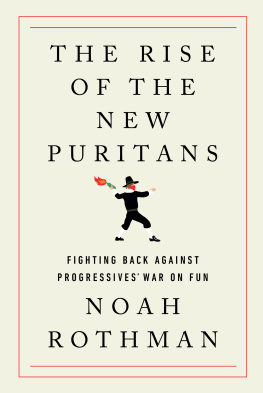Contents
Guide
FOR MY WIFE, JARYN. THIS WAS ALL HER IDEA.
Contents
Y ou are not fragile. You wont shatter upon contact with a thought or phrase you find offensive. If you really think youre that timid, this is not the book for you.
This is a book for grown-ups.
You will be confronted with uncomfortable subjects, antisocial behaviors, and ugly words. You will be made to think about the things you enjoy that others regard as destructive to the social fabric. And you will be asked to evaluate the ways in which your behavior affects the lives of those around you and society at large.
These are the questions that consume those who believe themselves to be so competent, upstanding, and principled that they should reorder society around their personal preferences. This book is about those very people: the busybodies, the hecklers, the moralizers, the meddlers, and the zealots. Its a book about a particular human trait, one that waxes at certain periods in history and wanes in others, but that is always with us. That is, our hostility toward the aberrant and our instinctive desire to impose consistency on our surroundings.
That human trait is present in abundance today. Possessed of an unflappable faith in their own righteousness and an unhealthy level of social anxiety, a new class of activist is busily judging almost everything you do. Youre not eating right; not healthfully enough and not sufficiently conscious of the damage your habits are doing to your surroundings. Youre not consuming the right media; the indecent frivolities you like so much are giving license to degenerates. Youre not thinking the things you should; at least, not when youre preoccupied with diversions that distract you from the crushing pain of existence in an imperfect world, even for just a few minutes.
This meddlesomeness is not new. What is newor, rather, unfamiliaris that these traits are no longer the exclusive province of the Anglo-American right. Not long ago, imposing a moral framework on every aspect of life was a conservative predilection. It was the right that didnt like the music you listened to, the television you watched, or the tabloid trash you read. It was the right that identified antisocial themes in seemingly harmless entertainment products that only they, with their keen senses of propriety, could discern. It was the right that saw the world through a moral prism, and it was the right that policed violations of its preferred ethical framework with vigor.
When it was the right doing the moralizing, the left could be counted on to oppose them. American liberals reliably objected not only to conservative dogma, but to almost any social program that came at the expense of individual self-fulfillment in whatever form it tookeven those forms that were self-destructive and contemptuous of accepted social norms.
For most of us, this dynamicleft-leaning libertinism versus conservative prudishnesshas pertained for all our adult lives. In this young century, though, that dynamic has begun to change. Indeed, it is evolving into a form that is far more historically familiar.
As the left gravitates more toward progressivism and away from liberalism, it has assumed many of progressivisms utopian conceits. Chief among them, an all-consuming conviction that the way youre living your life is not only wrong but harmful to everyone around you. And that way of life cannot be allowed to stand.
No longer do progressives subscribe to the new morality that took shape in the 1960s and took over in the 1990s. A much older form of propriety is today taking its place, one that emphasizes political utility over personal pleasure. From the comedy you enjoy to the sports you watch to the sex you have (or, increasingly, dont), a particular sort of left-wing activist insists that these and many other private activities have a public dimension. They must contribute to the promotion of a wholesome societyone that is observant of their preferred pieties and advances their political objectives. Anything that fails to serve this purpose is worse than worthless; it stands in the way of progress.
The outlook Im describing is, indeed, puritanical. Progressives are unlikely to recognize that preachy and prudish impulse in themselves, but that is vanity. Progressivism in the transatlantic world arose from the ashes of the Puritan experiment. Throughout its history, progressive thought adhered to a theory of social organization that placed the perfection of the human condition above more quotidian affairs. It was as much a moral crusade as a political program. The pursuit of purity has found a home in many American political coalitions over the centuries because it is deeply ingrained. We are all heirs to that traditionaspiring social reformers more so than most.
The revolutionary, pseudo-religious ideas that will be explored in this book and the tactics employed to enforce them are alarming. They are rapidly acquiring adherents, and those adherents are enthusiastically imposing themselves on dissidents and silencing dissenters. In January 2019, I published a book on this very subject: Unjust: Social Justice and the Unmaking of America. The ethos I set out to write against in early 2017 was in its infancy at the time, but its aims were clear. The modern social-justice advocate sought to rewrite many of the fundamental precepts that underwrote classical liberalism.
This was a movement that wanted to replace the fundaments of English common lawlittle things like high evidentiary standards for criminal conviction and the ability to confront your accuser in courtwith a system that meted out a karmic comeuppance to those who were born into the wrong identities. It wanted to remake the United States in ways that were incompatible with our preexisting legal conventions, frustrating social-justice advocates and leading them into an abject fatalism that too often manifested itself in street violence.
These activists are, in many ways, a frightening constituency. But not in all ways. The social-justice enthusiasts who devote so much attention to societys most nagging ills are just as inclined to obsess over trivialities and popular culture. This is an insular movement that is easily misled by hucksters willing to cater to its members narcissism and reinforce their assumptions about the world.
This movements pride and sanctimony blinded it to some rather obvious political pitfalls into which it regularly stumbled. Those follies provided critics of social-justice activism with plenty of opportunities to point and laugh. That tendency has only grown more pronounced in the years since the publication of Unjust, which leads us to the premise of this book: Sure, the radical outlook on display is menacing. But what if it is also hilarious?
Youve probably heard the new progressive ethos described as puritanical before, and mostly in a derogatory context. This book endeavors to make that case as concretely as possible, grounding the thesis in an exploration of the ways puritanical society and the stuffy Victorianism into which it evolved sought to police morality.
The New Puritans believe we are conceived in sin and must be saved. They operate with confidence toward separating the worthy and the unworthy. They believe it essential to shame and shun the unfaithful, lest their ways corrupt the rest of us. They dismiss the unenlightened, detest the heedless culture weve inherited, and long for a world cleansed of human imperfections.
They are sure they will be forgiven for whatever it takes to get us there.
I intend to establish parallels linking efforts in the Anglo-American world to guard the public morality against degeneracy throughout history, from the late sixteenth century through to today. The purpose of this book is not only to condemn and inform but to popularize this case against the new puritanism. Toward that end, early modern spelling and grammar cited in primary documents from the sixteenth and seventeenth centuries have been modernized.









